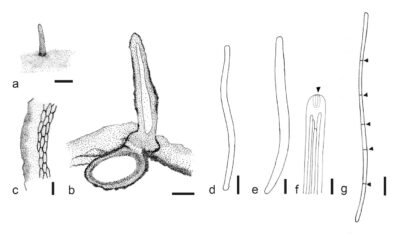Fungalpedia – Note 288, Tropohalonectria
Tropohalonectria R.H. Perera, E.B.G. Jones & K.D. Hyde
Citation when using this entry: Perera et al. 2024 (in prep) – Fungalpedia, genera described in 2016.
Index Fungorum, Facesoffungi, MycoBank, GenBank, Fig. 1
Classification: Ceratosphaeriaceae, Magnaporthales, Sordariomycetidae, Sordariomycetes, Pezizomycotina, Ascomycota, Fungi
Perera et al. (2016) introduced monotypic genus Tropohalonectria to accommodate Pseudohalonectria suthepensis, which clustered distantly from Pseudohalonectria, based on LSU-SSU-tef1α phylogeny and morphological differences. Tropohalonectria is characterized by dark brown, globose to ellipsoidal ascomata with a neck. They occur solitary or in small clusters and, are immersed beneath raised host surface. The peridium is pale brown and comprises of 2–3 strata. The inner layer consists of compressed angular cells while cells of outer layer are less distinct and fuse with host tissue. Paraphyses are numerous, filamentous, septate, unbranched, hyaline, tapered and longer than asci. Asci are 8-spored, cylindrical and apedicellate with a rounded to slightly acute apex and a J-, cylindrical apical ring. Ascospores are 4–7 septate, hyaline (yellow to light orange in mass) and filiform with a slightly acute apex and rounded base. They lack sheaths or appendages. The asexual morph is undetermined (Promputtha et al. 2004). However, Yang et al. (2023) observed that Pseudohalonectria suthepensis grouped within the Ceratosphaeria sister to C. flava in their phylogenetic analysis of a broader sampling of Ceratosphaeria taxa. Therefore, Yang et al. (2023) proposed a new name combination, Ceratosphaeria suthepensis. The presence of immersed ascomata with a long yellowish neck, cylindrical asci with a non-amyloid apical ring, and hyaline filiform ascospores in P. suthepensis also confirms that the taxon is a member of Ceratosphaeria (Yang et al. 2023).
Type species: Tropohalonectria suthepensis (Promp.) R.H. Perera, E.B.G. Jones & K.D. Hyde
Other accepted species: This genus is monotypic
Figure 1 – Pseudohalonectria suthepensis (PDD76762, holotype). a Ascoma partially immersed in host substrate. b Section of ascoma. c Peridium. d, e Asci. f Apical ring (arrowhead). g Filiform ascospore with septa (arrowhead). Scale bars: a = 300 μm, b = 100 μm, c, d = 20 μm, e = 10 μm, f = 5 μm, g = 10 μm. Redrawn from van der Promputtha et al. (2004).
References
Entry by
Rekhani Hansika Perera, Center of Excellence in Fungal Research, Mae Fah Luang University, Chiang Rai, 57100, Thailand.
(Edited by Kevin D. Hyde, Samaneh Chaharmiri-Dokhaharani, & Achala R. Rathnayaka)
Published online 28 May 2024
